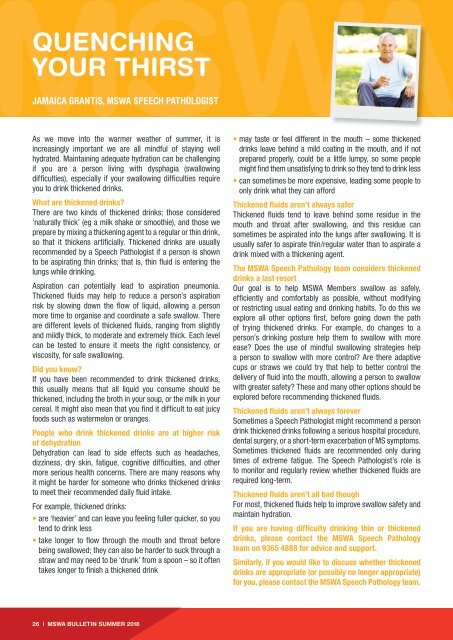Create successful ePaper yourself
Turn your PDF publications into a flip-book with our unique Google optimized e-Paper software.
QUENCHING<br />
YOUR THIRST<br />
JAMAICA GRANTIS, <strong>MSWA</strong> SPEECH PATHOLOGIST<br />
VOICE BANKING<br />
LAURA RYAN, <strong>MSWA</strong> SPEECH THERAPY ASSISTANT<br />
As we move into the warmer weather of summer, it is<br />
increasingly important we are all mindful of staying well<br />
hydrated. Maintaining adequate hydration can be challenging<br />
if you are a person living with dysphagia (swallowing<br />
difficulties), especially if your swallowing difficulties require<br />
you to drink thickened drinks.<br />
What are thickened drinks?<br />
There are two kinds of thickened drinks; those considered<br />
‘naturally thick’ (eg a milk shake or smoothie), and those we<br />
prepare by mixing a thickening agent to a regular or thin drink,<br />
so that it thickens artificially. Thickened drinks are usually<br />
recommended by a Speech Pathologist if a person is shown<br />
to be aspirating thin drinks; that is, thin fluid is entering the<br />
lungs while drinking.<br />
Aspiration can potentially lead to aspiration pneumonia.<br />
Thickened fluids may help to reduce a person’s aspiration<br />
risk by slowing down the flow of liquid, allowing a person<br />
more time to organise and coordinate a safe swallow. There<br />
are different levels of thickened fluids, ranging from slightly<br />
and mildly thick, to moderate and extremely thick. Each level<br />
can be tested to ensure it meets the right consistency, or<br />
viscosity, for safe swallowing.<br />
Did you know?<br />
If you have been recommended to drink thickened drinks,<br />
this usually means that all liquid you consume should be<br />
thickened, including the broth in your soup, or the milk in your<br />
cereal. It might also mean that you find it difficult to eat juicy<br />
foods such as watermelon or oranges.<br />
People who drink thickened drinks are at higher risk<br />
of dehydration<br />
Dehydration can lead to side effects such as headaches,<br />
dizziness, dry skin, fatigue, cognitive difficulties, and other<br />
more serious health concerns. There are many reasons why<br />
it might be harder for someone who drinks thickened drinks<br />
to meet their recommended daily fluid intake.<br />
For example, thickened drinks:<br />
• are ‘heavier’ and can leave you feeling fuller quicker, so you<br />
tend to drink less<br />
• take longer to flow through the mouth and throat before<br />
being swallowed; they can also be harder to suck through a<br />
straw and may need to be ‘drunk’ from a spoon – so it often<br />
takes longer to finish a thickened drink<br />
• may taste or feel different in the mouth – some thickened<br />
drinks leave behind a mild coating in the mouth, and if not<br />
prepared properly, could be a little lumpy, so some people<br />
might find them unsatisfying to drink so they tend to drink less<br />
• can sometimes be more expensive, leading some people to<br />
only drink what they can afford<br />
Thickened fluids aren’t always safer<br />
Thickened fluids tend to leave behind some residue in the<br />
mouth and throat after swallowing, and this residue can<br />
sometimes be aspirated into the lungs after swallowing. It is<br />
usually safer to aspirate thin/regular water than to aspirate a<br />
drink mixed with a thickening agent.<br />
The <strong>MSWA</strong> Speech Pathology team considers thickened<br />
drinks a last resort<br />
Our goal is to help <strong>MSWA</strong> Members swallow as safely,<br />
efficiently and comfortably as possible, without modifying<br />
or restricting usual eating and drinking habits. To do this we<br />
explore all other options first, before going down the path<br />
of trying thickened drinks. For example, do changes to a<br />
person’s drinking posture help them to swallow with more<br />
ease? Does the use of mindful swallowing strategies help<br />
a person to swallow with more control? Are there adaptive<br />
cups or straws we could try that help to better control the<br />
delivery of fluid into the mouth, allowing a person to swallow<br />
with greater safety? These and many other options should be<br />
explored before recommending thickened fluids.<br />
Thickened fluids aren’t always forever<br />
Sometimes a Speech Pathologist might recommend a person<br />
drink thickened drinks following a serious hospital procedure,<br />
dental surgery, or a short-term exacerbation of MS symptoms.<br />
Sometimes thickened fluids are recommended only during<br />
times of extreme fatigue. The Speech Pathologist’s role is<br />
to monitor and regularly review whether thickened fluids are<br />
required long-term.<br />
Thickened fluids aren’t all bad though<br />
For most, thickened fluids help to improve swallow safety and<br />
maintain hydration.<br />
If you are having difficulty drinking thin or thickened<br />
drinks, please contact the <strong>MSWA</strong> Speech Pathology<br />
team on 9365 4888 for advice and support.<br />
Similarly, if you would like to discuss whether thickened<br />
drinks are appropriate (or possibly no longer appropriate)<br />
for you, please contact the <strong>MSWA</strong> Speech Pathology team.<br />
I have donated my voice. Not a sentence I thought I would<br />
ever say.<br />
Being a therapy assistant in the <strong>MSWA</strong> Speech Pathology<br />
Department suits my personality perfectly. Every day I<br />
am helping people, by implementing a therapy program<br />
to help people with their communication devices. These<br />
communication devices enable people, that might otherwise<br />
be unable, to express their thoughts and emotions. They<br />
empower people to share their opinion, initiate conversations,<br />
tell jokes, instruct others and much, much more. Picture the<br />
late Steven Hawking if you don’t know anyone who used one.<br />
When setting up a communication device, you can often pick<br />
from several pre-recorded voices, male or female etc. This is<br />
great, however, they usually don’t sound anything like you. This<br />
is where ‘voice banking’ comes in, not to be confused with<br />
message banking, which is recording a sentence to be played<br />
back exactly as it was recorded eg. “I love you sweetie.”<br />
Voice banking is recording a sample of your voice to create<br />
a unique synthetic voice that can then be used with these<br />
communication devices. The quality of the finished synthetic<br />
voice depends on the number of sentences and the quality of<br />
the voice recorded. So, it’s crucial to complete the recordings<br />
early on even if you think you might not need it.<br />
Recording your voice can be a lengthy process, recording<br />
anywhere between 400 – 3,200 sentences, the more you<br />
record the more personal the synthetic voice will sound. It’s<br />
advisable to complete the recordings over several sittings,<br />
such as a few sentences at the same time each day so this<br />
can take several weeks or months to complete depending on<br />
your fatigue levels and other commitments. So, it’s strongly<br />
recommended that you begin voice banking as early as<br />
possible. Once you have completed the recordings you can<br />
listen to your synthetic voice before deciding if you would like<br />
to use it.<br />
What if it’s too late? If you’re unable to record the sentences<br />
but have a close relative who sounds like you, they might be<br />
willing to do the recordings and ‘donate their voice’ for your<br />
use. Because synthetic voices sound slightly robotic in nature<br />
you won’t sound exactly the same as each other.<br />
I recorded 3,155 sentences, which seemed never-ending<br />
whilst recording them, however, I was intrigued to hear what<br />
a synthetic me would sound like. I had a listen after 650<br />
sentences and I was really impressed, it definitely sounded<br />
like me. The more I recorded the better it got but I would have<br />
been very happy using it at that level had I needed to! So,<br />
my synthetic voice is now available for people to use on their<br />
device, who knows one day I might bump into someone using<br />
it, wouldn’t that be amazing! I might even need it myself or it<br />
will never be used by anyone, but I will have had the experience<br />
of recording it to assist others through the process.<br />
Interesting fact: Stephen Hawking’s voice, ‘Perfect Paul’,<br />
was derived from recordings of Dennis Klatt, an American<br />
researcher in speech science and the pioneer of computerised<br />
speech synthesis. Dennis recorded his own voice when<br />
developing the software and this became the voice you heard<br />
when listening to Stephen Hawking. Dennis Klatt later lost his<br />
voice to cancer prior to his death in 1988.<br />
26 | <strong>MSWA</strong> BULLETIN SUMMER <strong>2018</strong> <strong>MSWA</strong> BULLETIN SUMMER <strong>2018</strong> | 27


















